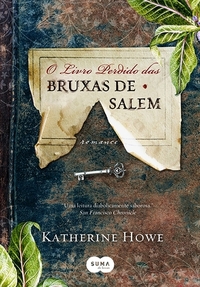Take a photo of a barcode or cover
mysterious
tense
medium-paced
Plot or Character Driven:
A mix
Strong character development:
Yes
Loveable characters:
Yes
Diverse cast of characters:
No
Flaws of characters a main focus:
Yes
dark
mysterious
slow-paced
Plot or Character Driven:
Plot
Strong character development:
No
Loveable characters:
Complicated
Diverse cast of characters:
No
Flaws of characters a main focus:
No
I read Howe's recent book (A True Account) and abosolutely loved it, so I was excited to read her first novel which promised a similar style. Sadly everything I loved about A True Account was missing in The Physick Book, and it was a real slog to get through. The parts set in 1692 and other years in the 17th and 18th centuries were excellent, Howe has a real gift for changing her prose to match the era, which is what made A True Account so compelling: the narrative "voices" for the 1720s and the 1930s transports you perfectly, and the same is true for the pre-modern chapters of The Physick Book. I loved following the descedents of witches through the ages... but there was not nearly enough of that! Instead most of the book is spent in 1991 with irritating characters, poor "banter", and a villian who made themselves known in chapter one, so not much of a twist.
I think it must be very difficult to write an intellectual heroine. S/he cannot be too smart, because she'll solve all the puzzles too fast and there will be no mystery. She cannot be too slow to solve an easy puzzle, or she just looks dumb. I felt like the hero here, Connie, who has passed her qualifying exams for the PhD, did not get very good puzzles to work with. Ultimately this book is about research, and research in itself as an act is not very interesting to watch. However, I do give the author some leeway because she name-dropped one of my favorite historical texts, [b:A Midwife's Tale: The Life of Martha Ballard, Based on Her Diary, 1785-1812|15594|A Midwife's Tale The Life of Martha Ballard, Based on Her Diary, 1785-1812|Laurel Thatcher Ulrich|http://photo.goodreads.com/books/1327647744s/15594.jpg|1629653]. (digression: I got to read that in an undergrad history class, and between that book and the professor, I really learned a lot about digging into a primary source.)
3.5 stars. This book has been on my TBR since 2014 and I’m glad I rediscovered this. I was hoping that it would be more focused on the 17th Century timeline but most of the book is set in 1991. Really this is a book about a historical researcher looking into a person from the 1690s. Its less about the Salem witches than I expected.
challenging
dark
emotional
informative
mysterious
sad
medium-paced
Plot or Character Driven:
A mix
Strong character development:
Yes
Loveable characters:
Yes
Diverse cast of characters:
Complicated
Flaws of characters a main focus:
No
I don't give very many 5 star ratings...so I suppose that means you should all run out and get this one!
I ended up liking this book a lot more than I thought I would. I got it for cheap somewhere and it's sat on my bookshelf for years, but finally got around to it as part of a TBR challenge for a Goodreads group, hoping to read some books that have just been taking up space for a while to clear room on my shelves. Unfortunately (or ... fortunately?) that won't work with this one. I liked it enough I'll be keeping it around. I'd give it 4.5 stars if I could. Maybe someday I'll come back and up this to 5, we'll see if my feelings last over time.
I worried I wouldn't like the book because of the witchcraft aspect. I'm generally not a fan of things with supernatural explanations when they otherwise appear to be in the real world. Obviously, I'm a fan of fantasy and science fiction, so I'm capable of suspending belief but ... I typically like my "real world" and my "fantasy world" to be separate, not blended. However, this book initially starts out in the "real world" and then morphs. But it is done so well! And it probably helped that it was obvious from the get-go that there would be some magic involved.
I really loved the historical aspects to this book, and the additional information the author provided after the novel was complete was just as interesting. It was fun to follow along with Connie's research and, although her and my grad school experiences and "research" were really different, it was neat to live that stage of life vicariously through her. I also really loved her relationships -- with her mother, her best friend, her adviser, and Sam. Sam was awesome. 'nuff said.
Definitely worth a read if you like historical novels!
I worried I wouldn't like the book because of the witchcraft aspect. I'm generally not a fan of things with supernatural explanations when they otherwise appear to be in the real world. Obviously, I'm a fan of fantasy and science fiction, so I'm capable of suspending belief but ... I typically like my "real world" and my "fantasy world" to be separate, not blended. However, this book initially starts out in the "real world" and then morphs. But it is done so well! And it probably helped that it was obvious from the get-go that there would be some magic involved.
I really loved the historical aspects to this book, and the additional information the author provided after the novel was complete was just as interesting. It was fun to follow along with Connie's research and, although her and my grad school experiences and "research" were really different, it was neat to live that stage of life vicariously through her. I also really loved her relationships -- with her mother, her best friend, her adviser, and Sam. Sam was awesome. 'nuff said.
Definitely worth a read if you like historical novels!
This book had been on my wishlist for quite awhile as I've always been intrigued by the history and story of the Salem Witch Trials. Author Katherine Howe is a descendant of two Salem women of the time---one who survived the Trials and one who did not. Her interest in her family history spurred her to write this story---just like my New England heritage is part of why I'm interested in the subject as well. I've read a lot on it---but nothing like this.
If I don't think too much about the plethora of plot holes, immaturity and lack of education of a supposed Harvard graduate student, extremely annoying predictability of every part of the story, and stereotypical character types; as well as the fact that the moment the protagonist has been waiting for---the unearthing of the object she's searching for throughout the ENTIRE book---is alluded to rather than actually described...if I don't think about all of that and more, this book is not so bad.
Everything I've ever read on the subject assumes the women were set up by jealous or resentful villagers or that hysteria blinded the leaders and pride kept them blind. Nothing I've read has ever asked the question that Howe asks: What if they really were witches?
What was really interesting to me is that she doesn't just ask if they really were witches---but if they were witches AND Christians? She makes the point that we really only understand things at the level of technology that we've advanced to. With the Puritan Movement in full swing in New England, there was still a lot of confusion as to how God worked in the lives of his people. The Trials served as a catalyst to decide how far one could go in interfering in the lives of others and still "blame" God for the outcome.
As far as "levels of witchcraftiness" in the book---it really doesn't become a thing until toward the end and it's not super sinister freaky weird. It still seems out of place in a book that was showing such promise "scientifically" without a bunch of supernatural nonsense.
The theme I loved the most in the story was the story of the mother/daughter bond throughout the generations.
This is one of those stories that makes everything known to the reader before the characters are aware. Whether or not that was intentional, it was interesting seeing how things played out---even though there were no surprises.
If I don't think too much about the plethora of plot holes, immaturity and lack of education of a supposed Harvard graduate student, extremely annoying predictability of every part of the story, and stereotypical character types; as well as the fact that the moment the protagonist has been waiting for---the unearthing of the object she's searching for throughout the ENTIRE book---is alluded to rather than actually described...if I don't think about all of that and more, this book is not so bad.
Everything I've ever read on the subject assumes the women were set up by jealous or resentful villagers or that hysteria blinded the leaders and pride kept them blind. Nothing I've read has ever asked the question that Howe asks: What if they really were witches?
What was really interesting to me is that she doesn't just ask if they really were witches---but if they were witches AND Christians? She makes the point that we really only understand things at the level of technology that we've advanced to. With the Puritan Movement in full swing in New England, there was still a lot of confusion as to how God worked in the lives of his people. The Trials served as a catalyst to decide how far one could go in interfering in the lives of others and still "blame" God for the outcome.
As far as "levels of witchcraftiness" in the book---it really doesn't become a thing until toward the end and it's not super sinister freaky weird. It still seems out of place in a book that was showing such promise "scientifically" without a bunch of supernatural nonsense.
The theme I loved the most in the story was the story of the mother/daughter bond throughout the generations.
This is one of those stories that makes everything known to the reader before the characters are aware. Whether or not that was intentional, it was interesting seeing how things played out---even though there were no surprises.
3.5 STARS
"Also published as "The Lost Book of Salem".
Harvard graduate student Connie Goodwin needs to spend her summer doing research for her doctoral dissertation. But when her mother asks her to handle the sale of Connie's grandmother's abandoned home near Salem, she can't refuse. As she is drawn deeper into the mysteries of the family house, Connie discovers an ancient key within a seventeenth-century Bible. The key contains a yellowing fragment of parchment with a name written upon it: Deliverance Dane. This discovery launches Connie on a quest--to find out who this woman was and to unearth a rare artifact of singular power: a physick book, its pages a secret repository for lost knowledge. As the pieces of Deliverance's harrowing story begin to fall into place, Connie is haunted by visions of the long-ago witch trials, and she begins to fear that she is more tied to Salem's dark past then she could have ever imagined." (From Amazon)
I found the middle part a bit dragging but the end went by in a blur. On the whole though I found it interesting and engaging. I liked Sam ;)
"Also published as "The Lost Book of Salem".
Harvard graduate student Connie Goodwin needs to spend her summer doing research for her doctoral dissertation. But when her mother asks her to handle the sale of Connie's grandmother's abandoned home near Salem, she can't refuse. As she is drawn deeper into the mysteries of the family house, Connie discovers an ancient key within a seventeenth-century Bible. The key contains a yellowing fragment of parchment with a name written upon it: Deliverance Dane. This discovery launches Connie on a quest--to find out who this woman was and to unearth a rare artifact of singular power: a physick book, its pages a secret repository for lost knowledge. As the pieces of Deliverance's harrowing story begin to fall into place, Connie is haunted by visions of the long-ago witch trials, and she begins to fear that she is more tied to Salem's dark past then she could have ever imagined." (From Amazon)
I found the middle part a bit dragging but the end went by in a blur. On the whole though I found it interesting and engaging. I liked Sam ;)
mysterious
medium-paced
Plot or Character Driven:
A mix
Strong character development:
Yes
Loveable characters:
Yes
Diverse cast of characters:
No
Flaws of characters a main focus:
No
I struggled to finish this book. While I did not mind the jumping around between time periods, I found other aspects of the writing distracting and difficult like the writing in dialect. The use a naïve character to explain parts of the Salem witch trials and the history of witches came off as forced and ventured into book report territory for me. The second half of the book picked up, but overall I found the book very predictable and did not hold my attention well.
The best line in the book: "Reminding you to experience your body for what it is--a collection of wonderous coincidences assembled by intelligent Goddess, engaging with the world on its own terms."
The best line in the book: "Reminding you to experience your body for what it is--a collection of wonderous coincidences assembled by intelligent Goddess, engaging with the world on its own terms."






